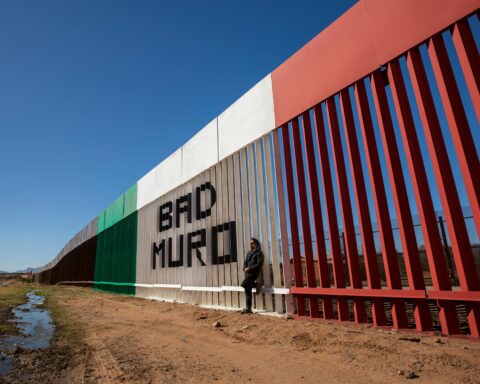It was a moment of delightful reflection. The indecently smug politicians of a distant island continent, wealthy, cruel in refugee policy and lazy in development, stunned by encountering a short fused U.S. President who had little time for a “dumb” deal.
That deal, prematurely hatched during the last stages of the Obama administration with the Turnbull government, would see 1,250 refugees on Australia’s questionable offshore centres on Manus Island and Nauru, settled in the United States.
(As Canada’s prime minister Justin Trudeau heads to Washington for his first meeting with U.S. President Donald Trump and the province of Manitoba deals with a large number of refugees streaming across the border, Turnbull’s experience could prove useful. As ipolitics.ca has reported, the visit comes on the heels of reports of diplomatically bruising phone calls between Trump and both Turnbull and Mexican President Enrique Pena Nieto, in which he apparently broke diplomatic protocol and slammed both for an Australian-US refugee-swapping deal and Mexico’s handling of “tough hombres.”)
Australia’s fanatical insistence on not processing refugees and asylum seekers arriving by sea lanes has produced a flawed and unsustainable gulag system in the Pacific, along with deals of mind scratching eccentricity.
Poorer countries such as Cambodia and Nauru are deemed appropriate processing centres and places of re-settlement, despite local hostilities and incompatibilities. Wealthier countries such as New Zealand tend to be ignored as optional points since resettlement there, should it happen, would be embolden new arrivals. The one exception – the United States – was largely premised on both its distance from Australia and daftness of mind amongst Canberra’s policy fraternity.
In its desperation to find customers in the global supermarket of refugee shopping, Washington offered a tentative hand to feed the Australian habit. That hand was rapidly withdrawn on Donald Trump’s signing of the Executive Order banning travel from seven mainly Muslim states. Many of these nationals feature in the 1,250 total, with Iranians making up the largest cohort. (It was a deal that Turnbull, incidentally, refused to condemn: Australia, he realises, knows what bans and bars to immigrants and refuges look like.)
According to the Washington Post, Trump explained in exasperated fashion to Australia’s Malcolm Turnbull by phone that the agreement was “the worst deal ever” and made it clear he was “going to get killed” politically if it was implemented. In his pointed assertion, Turnbull was effectively attempting to export the “next Boston bombers” to the United States. Australia, usually painfully supine before the wishes of the United States, had surprised Trump with “the worst call by far.”
Caught by the icy fury of the Trump blast, the conversation between the two leaders was cut short: what was slated for an hour became a 25 minute heckle and boast. The size of Trump’s electoral college win was reputedly mentioned, while the number of refugees was inflated.
Did The Donald hang up on the stunned Turnbull? The meek response followed: “I’m not going to comment on the conversation.” The official record from Washington made the school boy encounter dully deceptive: “Both leaders emphasized the enduring strength and closeness of the US-Australia relationship that is critical for peace, stability, and prosperity in the Asia-Pacific region and globally.”
Taking to his preferred medium of announcement and expression, he tweeted in disbelief that he could be bound by a previous undertaking: “Do you believe it? The Obama Administration agreed to take thousands of illegal immigrants from Australia. Why? I will study this dumb deal!”
Turnbull preferred an Alice in Wonderland approach to Trump’s tongue lashing, beating a hasty retreat down the rabbit hole in confused hope. Citing what seemed to be a distinctly different, mutated conversation, a brow beaten Turnbull preferred to refer to the president’s official spokesman who confirmed that “the president … would continue with, honour the agreement we entered into with the Obama administration, with respect to refugee settlement.”
This parallel diplomacy approach was also adopted before the National Press Club: “The Trump administration has committed to progress with the arrangements to honour the deal… that was entered into with the Obama administration, and that was the assurance the president gave me when we spoke on the weekend.”
To be fair to the confused Turnbull, the Trump administration is proving to be quite a tease. Volcanic contradictions are fizzling out of the White House on a daily basis, the toddler, as he has been accused of being, ever erratic with his tempers. Trump pours cold water on the deal; the White House spokesman Sean Spicer, probably informed by a different set of whispers, comes up with another statement that Washington would, in fact, follow through:
“The deal specifically deals with 1,250 people,” explained Spicer to the White House press corps, “they’re mostly in Papua New Guinea, being held… there will be extreme vetting applied to all of them as part and parcel of the deal that was made.”
Even if this near aborted deal were to revive in spectacular confusion, it would only apply to refugees who “express an interest” in being settled in the US, and who satisfied an “extreme vetting” regime. Numbers matter less than process, or, in the words of secretary of the immigration department Mike Pezzullo from November, this was “a process-driven arrangement rather than a numerical arrangement.” What price humanity.
This entire incident is being taken as a litmus test of Trump’s relations with his allies. Will the man boy behave or berate? Towards Mexico and Australia, his approach is one of irritable businessman rather than sober statesman.
Nor should the other side be neglected in this farcical cut of entertainment. Canberra could have embraced the other option, one unacceptable for the Turnbull government: abide by the Refugee Convention and duly settle the refugees in Australia. Can the cant; observe international law. Trump’s fumes of indignation would be avoided and Canberra would be doing something near unprecedented: implementing an approach of independence and obligation.
Binoy Kampmark was a Commonwealth Scholar at Selwyn College, Cambridge. He lectures at RMIT University, Melbourne. This commentary was adapted from Counter Punch. Email: [email protected].





